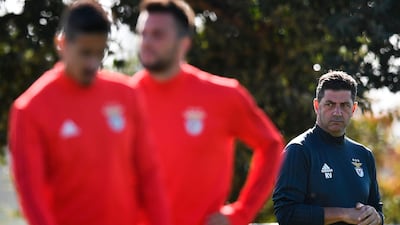"Don't remind Mr Abramovich," smiled Benfica's chief executive Domingos Oliveira during an exclusive interview with The National in Benfica's boardroom where a giant version of the club's 1960s shirt fills one of the walls.
Only Benfica’s great rivals Porto have been as astute in the transfer market and the point had been put to him about David Luiz, who Benfica sold to Chelsea for €25 million (Dh108m) plus Nemanja Matic. Then Benfica sold Matic for €25 million … to Chelsea.
Benfica know they do very well in their transfer dealings. For most football clubs, the revenues streams are commercial, ticketing and media. For Benfica, trading players for profit is a fourth stream. After three years in Lisbon, Matic flourished back at Chelsea, helping them win two Premier League titles, an FA Cup and League Cup.
Benfica know that they will always sell their best players, but their core business is to find the best players at an early stage before selling them to Madrid, Munich, Milan or Manchester. They buy players at 18, not 28.
The Lisbon club face tougher competition from the giants who want to cut out the middleman with their own extensive scouting operations, especially in South America, yet Benfica can offer advantages over clubs in richer leagues. There’s a more established pathway to first-team football, plus Lisbon life and connections which are far closer to those of South America.
_____________________________________________
_____________________________________________
“Porto started it and were very successful from the 1990s,” Domingos said. “Sporting have also done deals and they had a fantastic record during the time of Cristiano Ronaldo and Luis Figo. If you play for one of the big three clubs in Portugal then you have a ‘guarantee stamp’.
“Finding players while they’re cheaper allows us to sell them on as they’re moving towards the top – though there are exceptions like [the home-grown] Renato Sanches.”
Benfica have sold 13 players for €300 million in the past six years alone, the last big sale being Victor Lindelof, who along with Matic, is one of three current United employees who will be returning to the 64,000-seater Estadio do Luz on Wednesday.
The Serb is expected to start, while central defender Lindelof who has yet to establish himself in the first team at Old Trafford, will be back at a club where he performed so well that he earned his big money move to Manchester. Jose Mourinho is also going back to the first club he managed, albeit for only two months, in 2000.
The club they are returning to hasn’t had the best start to the season, sitting third in the Portuguese league five points behind Porto after losing their two opening matches. Benfica were also hammered 5-0 by Basel in their last Champions League group outing.
But Benfica have no injuries, while United, who top Group A having won their opening two matches, will be without Paul Pogba, Marouane Fellaini, Michael Carrick, plus the longer term injured players Zlatan Ibrahimovic and Marcus Rojo. Mourinho's side will be backed by a near sell-out 3,000 travelling contingent, hundreds who overcame Monarch going bust and Ryanair's cancellations to make the trip.
The two teams have met nine times, the most famous being the 1968 European Cup final when United became the first English team to win the competition. United have won six and lost only one, a 2005 defeat which eliminated United at the group stage for the first time since 1994. Two draws when the teams last met in the 2011/12 group stage were enough to help Benfica win the group and United finish third and again be eliminated.
___________________________________________
- Comeback No 4: Jupp Heynckes the firefighter Bayern Munich turn to in times of need
- Champions League talking points: Man City and Napoli in battle of pace-setters
- Ian Hawkey: Mauricio Pochettino hopes to buck his losing trend against Real Madrid
___________________________________________
Benfica were the best team in the world in the early 1960s, superseding the peerless Real Madrid side of the '50s. European Cup winners in 1961 and 1962, they reached three more finals in the 1960s, the side led by Eusebio, the club’s best-ever player. They also reached the final in 1988 and 1990, the five final defeats in succession still stinging older fans.
Success these days is getting out of the group stage, something which already looks difficult this season, but the club who have won the past four Portuguese titles are a success story because of their astuteness at spotting, developing and selling young talent.


